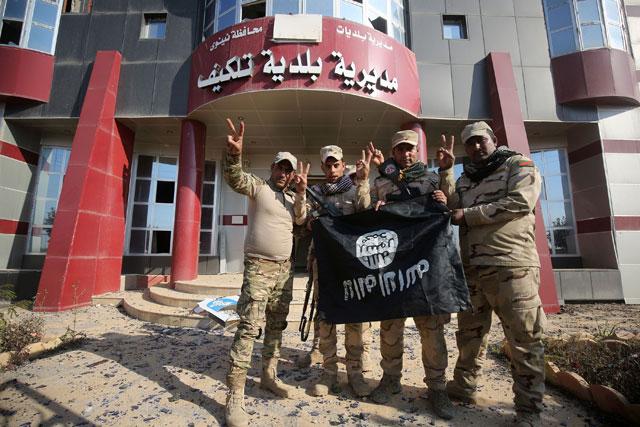You are here
Losing in Iraq, Daesh seeks to shore up Syria presence
By Reuters - Jan 21,2017 - Last updated at Jan 21,2017

Iraqi soldiers gesture as they hold a Daesh flag upside down outside a building in the town of Tel Keppe (Tel Kaif) in Mosul on Friday, during an ongoing military operation against Daesh (AFP photo)
BEIRUT — The Daesh terror group is fighting hard to reinforce its presence in Syria as it loses ground in Iraq, deploying fighters to seize full control of a government-held city in the east while at the same time battling enemies on three other fronts.
It underlines the residual strength of Daesh even after its loss of a cluster of cities in Iraq and half of Mosul, and points up the challenges facing US President Donald Trump in the war he has vowed to wage against the group.
The extremists have opened their most ferocious assault yet to capture the last Syrian government-controlled area in the eastern province of Deir Al Zor, a pocket of Deir Al Zor city that is surrounded by Daesh territory.
The assault has raised fears for tens of thousands of people living under government authority in the city. Their only supply route has been cut off since Daesh severed the road to the nearby air base earlier this week.
A military commander in the alliance of forces fighting in support of President Bashar Assad said Daesh was seeking to turn Deir Al Zor city into a base of operations.
“They want to take it by force — and right now,” said the commander, a non-Syrian who declined to be identified because he is not an official spokesman for the alliance that includes a range of Iranian-backed Shiite militias, Lebanon’s Hizbollah, and the Russian air force.
“The situation in Deir Al Zor is very difficult.”
Daesh appears focused on strengthening its hold over a triangle of Syrian territory connecting its main base of operations — Raqqa city — with Palmyra to the southwest and Deir Al Zor to the southeast.
Daesh seized Palmyra from government forces for a second time last month, a reversal for Assad just eight months after he had retaken control of the city and its world heritage site with the help of the Russian air force.
Daesh militants are also putting up stiff resistance against separate campaigns being waged against them in northern Syria, one by US-backed militias including Kurdish groups, and another by Turkish-backed Syrian rebel groups.
“They are able to fight on four fronts, if they were in a state of great weakness, they would not be able to do this,” said Rami Abdulrahman, director of the Syrian Observatory for Human Rights, a UK-based organisation reporting on the war.
A senior commander in the pro-Assad alliance, also a non-Syrian, said: “The strength of Daesh is that it is a cancerous tumour, and when you remove it from one place, it goes to another.”
The commander urged the US-led alliance and “every air force” to attack Daesh to stop it moving its convoys in the Deir Al Zor area, an apparent sign of dissatisfaction with the current level of support from the Russian air force there.
‘Final battle’
Though Daesh has faced military pressure in Deir Al Zor province, including raids by US special forces, the attacks against it there have been less intense than in other parts of its self-declared “caliphate”.
Deir Al Zor has so far been a secondary priority for the Syrian army and its allies, which are most concerned with their battle against rebel forces in western Syria.
The US-backed campaign led by Syrian Kurdish groups has meanwhile focused on encircling and taking Raqqa city.
Daesh has been asserting itself in Syria with trademark brutality, this week killing civilians execution-style in Palmyra’s Roman Theatre, the observatory reported.
Daesh has also generated headlines by blowing up more of Palmyra’s ancient ruins, with satellite imagery emerging on Friday showing the destruction of one of its most famous monuments.
Russia seized on the capture of Palmyra from Daesh last year as evidence of its efforts against the group in Syria, after critics accused it of mostly targeting moderate rebels.
As yet there has been no sign of a major effort to take back Palmyra a second time, though the Syrian army and its allies are currently battling Daesh to the west of the city.
If Trump follows through on suggestions that he may cooperate with Russia in the fight against Daesh, eastern Syria would be an obvious target. This would however mark a major shift in US policy because it would help Assad.
US policy under President Barack Obama was built on the idea that Assad had lost legitimacy. Obama rejected any cooperation with Assad in the fight against Daesh, describing his rule as part of the problem.
A Syrian official said the US-led coalition was doing nothing to prevent Daesh from moving its forces into Syria. “This is what’s helping Daesh,” the official said.
“After losing Mosul, Daesh will think of reinforcing its capacity in Raqqa and Deir Al Zor because at the end of the day, they don’t have any sanctuary. The final battle will certainly be there.”
Related Articles
BEIRUT — The Syrian air force hit an Daesh-controlled air base in Raqqa province on Tuesday, killing more than 140 militants, state media sa
PALMYRA, Syria — Syrian troops recaptured the ancient city of Palmyra from the Daesh terror group on Sunday and pledged to build on the win
BEIRUT — The Syrian army and its allies are fighting to secure and expand a precarious corridor to their comrades in Deir Ezzor, a day after
















